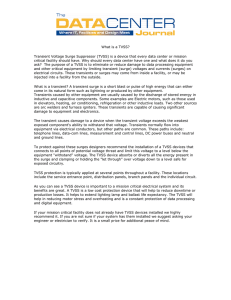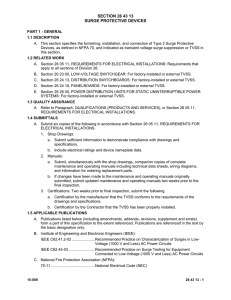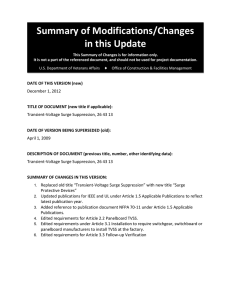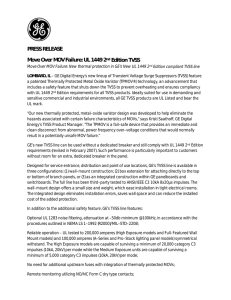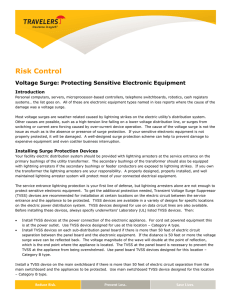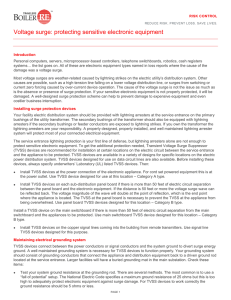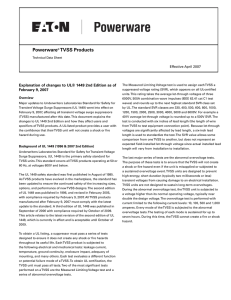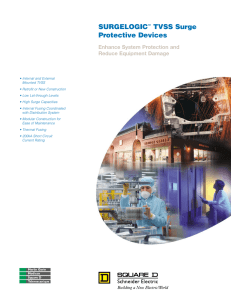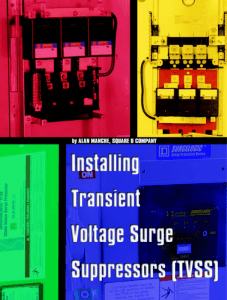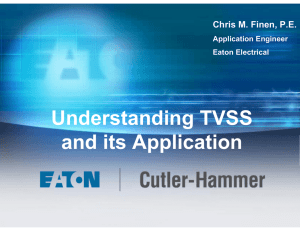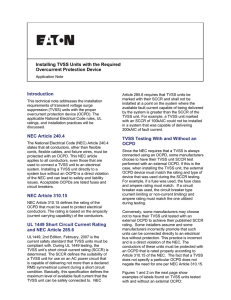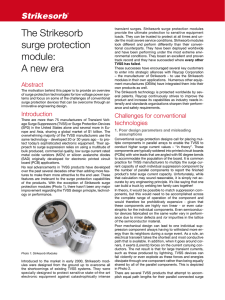12-01-12 SPEC WRITER NOTE: Delete between //----// if not applicable
advertisement
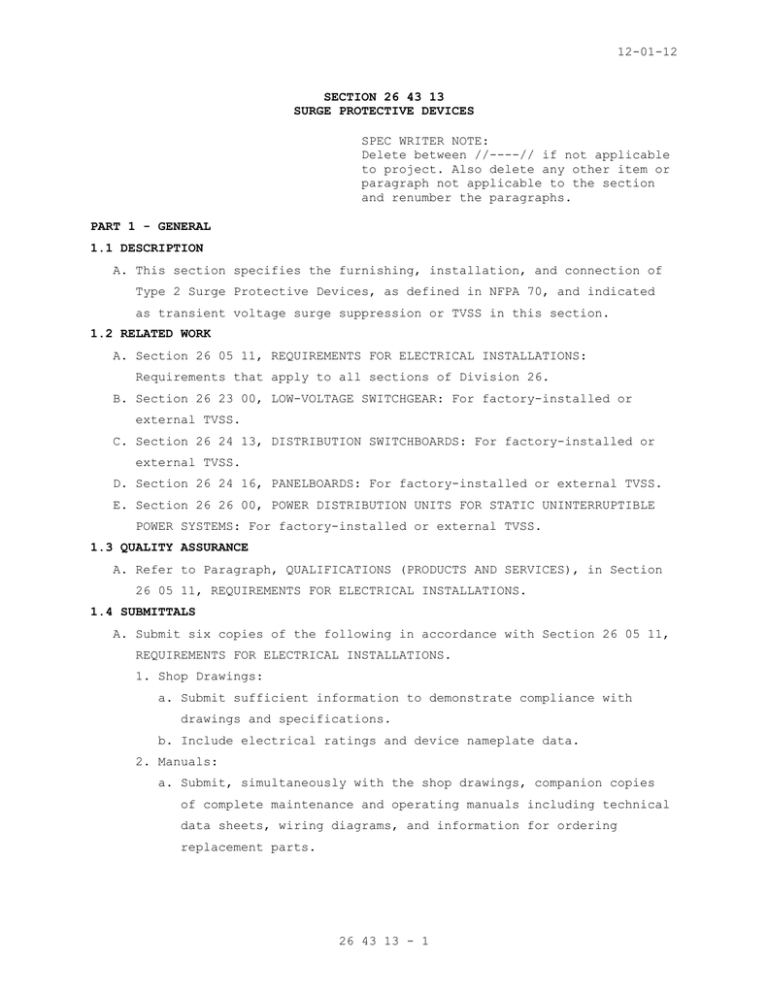
12-01-12 SECTION 26 43 13 SURGE PROTECTIVE DEVICES SPEC WRITER NOTE: Delete between //----// if not applicable to project. Also delete any other item or paragraph not applicable to the section and renumber the paragraphs. PART 1 - GENERAL 1.1 DESCRIPTION A. This section specifies the furnishing, installation, and connection of Type 2 Surge Protective Devices, as defined in NFPA 70, and indicated as transient voltage surge suppression or TVSS in this section. 1.2 RELATED WORK A. Section 26 05 11, REQUIREMENTS FOR ELECTRICAL INSTALLATIONS: Requirements that apply to all sections of Division 26. B. Section 26 23 00, LOW-VOLTAGE SWITCHGEAR: For factory-installed or external TVSS. C. Section 26 24 13, DISTRIBUTION SWITCHBOARDS: For factory-installed or external TVSS. D. Section 26 24 16, PANELBOARDS: For factory-installed or external TVSS. E. Section 26 26 00, POWER DISTRIBUTION UNITS FOR STATIC UNINTERRUPTIBLE POWER SYSTEMS: For factory-installed or external TVSS. 1.3 QUALITY ASSURANCE A. Refer to Paragraph, QUALIFICATIONS (PRODUCTS AND SERVICES), in Section 26 05 11, REQUIREMENTS FOR ELECTRICAL INSTALLATIONS. 1.4 SUBMITTALS A. Submit six copies of the following in accordance with Section 26 05 11, REQUIREMENTS FOR ELECTRICAL INSTALLATIONS. 1. Shop Drawings: a. Submit sufficient information to demonstrate compliance with drawings and specifications. b. Include electrical ratings and device nameplate data. 2. Manuals: a. Submit, simultaneously with the shop drawings, companion copies of complete maintenance and operating manuals including technical data sheets, wiring diagrams, and information for ordering replacement parts. 26 43 13 - 1 12-01-12 b. If changes have been made to the maintenance and operating manuals originally submitted, submit updated maintenance and operating manuals two weeks prior to the final inspection. 3. Certifications: Two weeks prior to final inspection, submit the following. a. Certification by the manufacturer that the TVSS conforms to the requirements of the drawings and specifications. b. Certification by the Contractor that the TVSS has been properly installed. 1.5 APPLICABLE PUBLICATIONS A. Publications listed below (including amendments, addenda, revisions, supplement and errata) form a part of this specification to the extent referenced. Publications are referenced in the text by the basic designation only. B. Institute of Engineering and Electronic Engineers (IEEE): IEEE C62.41.2-02........Recommended Practice on Characterization of Surges in Low-Voltage (1000 V and Less) AC Power Circuits IEEE C62.45-03..........Recommended Practice on Surge Testing for Equipment Connected to Low-Voltage (1000 V and Less) AC Power Circuits C. National Fire Protection Association (NFPA): 70-11...................National Electrical Code (NEC) D. Underwriters Laboratories, Inc. (UL): UL 1283-05..............Electromagnetic Interference Filters UL 1449-06..............Surge Protective Devices SPEC WRITER NOTE: Delete between // ---// if not applicable to project. Also delete any other item or paragraph not applicable to the section and renumber the paragraphs. PART 2 - PRODUCTS 2.1 SWITCHGEAR/SWITCHBOARD TVSS A. General Requirements: 1. Comply with IEEE and UL. 2. Modular design with field-replaceable modules, or non-modular design. 3. Fuses, rated at 200 kA interrupting capacity. 4. Bolted compression lugs for internal wiring. 26 43 13 - 2 12-01-12 5. Integral disconnect switch. 6. Redundant suppression circuits. 7. LED indicator lights for power and protection status. 8. Audible alarm, with silencing switch, to indicate when protection has failed. 9. Form-C contacts rated at 5 A and 250-V ac, one normally open and one normally closed, for remote monitoring of protection status. Contacts shall reverse on failure of any surge diversion module or on opening of any current-limiting device. 10. Four-digit transient-event counter. B. Surge Current per Phase: Minimum 240kA per phase. 2.2 PANELBOARD TVSS A. General Requirements: 1. Comply with UL 1449 and IEEE C62.41.2. 2. Modular design with field-replaceable modules, or non-modular design. 3. Fuses, rated at 200 kA interrupting capacity. 4. Bolted compression lugs for internal wiring. 5. Integral disconnect switch. 6. Redundant suppression circuits. 7. LED indicator lights for power and protection status. 8. Audible alarm, with silencing switch, to indicate when protection has failed. 9. Form-C contacts rated at 5 A and 250-V ac, one normally open and one normally closed, for remote monitoring of protection status. Contacts shall reverse on failure of any surge diversion module or on opening of any current-limiting device. 10. Four-digit transient-event counter. B. Surge Current per Phase: Minimum 120kA per phase. 2.3 ENCLOSURES A. Enclosures: NEMA //1// //3R//. SPEC WRITER NOTE: Delete between // ---// if not applicable to project. Also delete any other item or paragraph not applicable to the section and renumber the paragraphs. 26 43 13 - 3 12-01-12 PART 3 - EXECUTION 3.1 INSTALLATION A. Factory-installed TVSS: Switchgear, switchboard, or panelboard manufacturer shall install TVSS at the factory. B. Field-installed TVSS: Contractor shall install TVSS with conductors or buses between TVSS and points of attachment as short and straight as possible. Do not exceed manufacturer's recommended lead length. Do not bond neutral and ground. 1. Provide a circuit breaker as a dedicated disconnecting means for TVSS as shown on drawings. C. Do not perform insulation resistance tests on switchgear, switchboards, panelboards, or feeders with the TVSS connected. Disconnect TVSS before conducting insulation resistance tests, and reconnect TVSS immediately after insulation resistance tests are complete. 3.2 ACCEPTANCE CHECKS AND TESTS A. Perform in accordance with the manufacturer's recommendations. In addition, include the following: 1. Visual Inspection and Tests: a. Compare equipment nameplate data with specifications and approved shop drawings. b. Inspect physical, electrical, and mechanical condition. c. Verify that disconnecting means and feeder size and maximum length to TVSS corresponds to approved shop drawings. d. Verifying tightness of accessible bolted electrical connections by calibrated torque-wrench method. e. Vacuum-clean enclosure interior. Clean enclosure exterior. f. Verify the correct operation of all sensing devices, alarms, and indicating devices. 3.3 FOLLOW-UP VERIFICATION A. After completion of acceptance checks and tests, the Contractor shall show by demonstration in service that TVSS are in good operating condition and properly performing the intended function. 3.4 INSTRUCTION A. Provide the services of a factory-trained technician for one 2-hour training period for instructing personnel in the maintenance and operation of the TVSS, on the date requested by the //Resident Engineer// //COTR//. ---END--- 26 43 13 - 4
